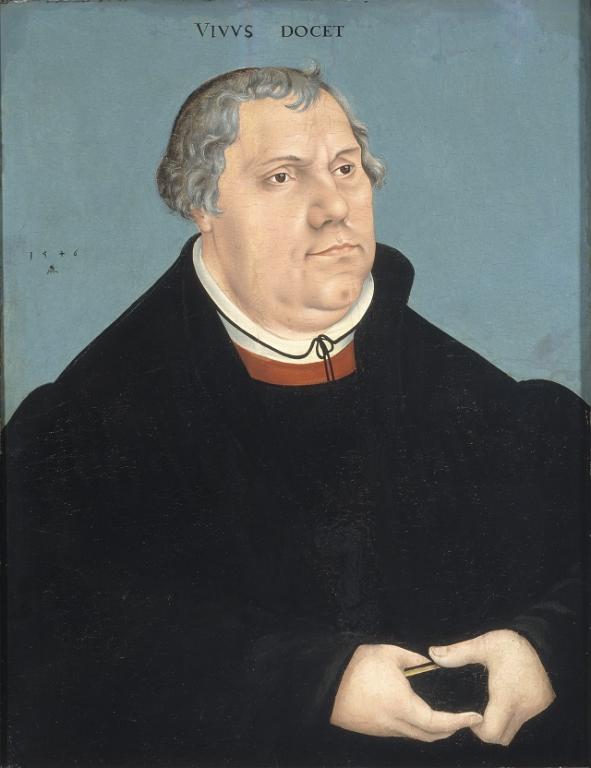
A Lutheran apologist says Luther wasn’t “agonized” over rampant sectarianism; I document that he was.
This whole “tempest in a teapot / mountain out of a molehill” pseudo-controversy came about as a result of Lutheran blogger Edward Reiss going on and on about one appendix of one obscure book of mine. In my 2007 volume, Protestantism: Critical Reflections of an Ecumenical Catholic, I described a set of quotations from Luther as evidences of Luther’s “Agony Over the State of Early Protestantism.” Fellow “reformers” Philip Melanchthon’s and Martin Bucer’s statements (in some ways even more explicit and specific) were also included in this appendix (and in the very title).
Reiss won’t let up. He insists on constructing the platform on which he is intent on hanging himself; including setting up the very noose. Last night (precisely because he wouldn’t let this thing die and save himself from embarrassment), I found further citations that, in effect, amount to Reiss pulling the lever to open the platform so that he can commit rhetorical suicide by self-inflicted hanging. I feel sorry for the guy. It didn’t have to happen. If he had known more about Luther’s history (something I have studied a great deal for now twenty years), he would have known better than to try to go down this dead-end road.
The citations below utilize my bolding, and also blue highlighting where Luther’s own words are concerned.
*****
First, let us document several of Reiss’ charges over my use of a single word, and the relation of several short Luther citations (singularly or collectively) to the word:
[E]ven if Luther did agonize over Protestantism, the citations in question need to support that if that is what the “point” of the citation is.(2-26-10)
Dave stated that this is evidence of Luther’s agony over the state of protestantism. There is no hint of agony over the state of protestantism. Perhaps you can point out the agony and/or the superiority of alms under the pope for me? (3-2-10)
Here is the reply I left on your blog. As you can see, there is no “agony” or anything like it. There isn’t even a sense that things are worse now. (3-2-10)
I am asking for the agony, the dispiritedness. DA used this quote to prove that Luther was in agony, and it simply doesn’t prove that. Thus DA misused the quote, . . . (3-5-10)
Could you point out Luther’s agony for me in the citation we are discussing? (3-5-10)
Adomnan,
I asked where in the quote supplied by DA, or in the document from which it originated, there is agony from Luther. You cannot do so because it is simply not there, and this is shown by yours and DA’s lack of citation of the wider work to show its context. You say that he had some agony in a general sense, but the discussion is whether or not the cite used by DA shows that he had agony. You have not pointed to any agony, . . .
DA,
I am afraid you have not proven anything. In the citation under discussion, there is no agony by Luther over the state of protestantism, nor does he praise the alms which went before. Thus as far as this citation is concerned he doe snot say things were better under the papacy. So your use of “agony” doesn’t even pertain here. Anyway, the way you define agony unless someone is completely satisfied, he is in “agony”. (3-7-10)
*
Does that mean I think Luther thought the “Reformation” itself or his ideas were utter failures? No, not at all. I have not contended that he thought that. In fact, I have often stated the opposite. As usual, the critics of my Luther research misrepresent my actual opinions. As I have noted (obviously to no avail), in this appendix I was applying his opinions to the “state of Protestantism”: not Protestantism as a theological viewpoint or idea.
I have criticized Luther several times for making no connection at all between some of his views and the immediate results as one cause among many (reiterated again recently: see #6 in the introduction), but I haven’t held an opinion that he thought the whole thing failed or that he regretted it altogether.
My Roget’s Thesaurus gives as synonyms of “agony” the following: “pain, distress, grief.” The online Thesaurus.com gives as synonyms for agony: “affliction, anguish, distress, dolor, misery, pangs, passion, throes, torment, torture, woe.”
I would say that at least half of those as applied to Luther’s views in his last years are well-nigh indisputable, according to biographers; e.g., especially “affliction, distress, misery.” Arguably “torment” and “torture” are too strong. But “agony” has that fairly wide range of meaning, according to the Thesaurus, and we shall see below that Luther applied it to his own state of mind, anyway: making much of this discussion a moot point altogether.
“Agony” is not — in any event — so far off (if it is “off” at all) that I deserve all of these unwarranted charges thrown my way for using it. Luther clearly was very unhappy about many things having to do with rampant Protestant sectarianism. That was my main point, and quibbling about whether “agony” was the right description does not evade the central point: that Luther was very unhappy, disappointed, etc. We mustn’t miss the forest for one leaf on one tree.
Given Luther’s well-known history of deep depression, I thought at the time I wrote (and still now) that “agony” was not too extreme of a description, and that it probably was in play. Nor have my assertions been overthrown or shown to be out of context.
All that said, It’s not like I am the only person in history who ever connected Luther and “agony” (or similar notion) over other Protestants, either. For example, I have found more than one biographer’s description in the same manner, and Luther’s own words as recorded by famous Lutheran biographer Julius Köstlin, and corroborated by other Protestant biographers.
If Luther himself used the word “agony” about his own feelings in dealing with Protestant sectarians, who is Edward Reiss to disagree? Now, he wants to quibble with Luther’s own words to describe himself, as if he knows better? Yet when I use the same word, it creates an avalanche of chaos and nonsense of protest?
Luther’s struggle with the Antinomians within his own camp is a clear indication that the Reformer was not apathetic to the practice of ‘good works’ among believers . . . in connection with the Antinomians and those who denied the Trinity Luther expressed his greatest agony, saying it might have been better had he never written anything than to endure the onslaught of the devil in this respect.
Luther’s fear of and struggle against those who at one time had appealed to him can only be understood when it is considered that the dissident groups were radicals in the true sense of the word . . . (Harry Loewen, Luther and the Radicals, Wilfrid Laurier Univ. Press, 3rd edition, 1974, pp. 156-157)
[in 1527] he was also vigorously carrying on a conflict with Zwingli and Oecolampadius. In a letter to Jonas [10 November 1527] he exclaimed, “O that Erasmus and the Sacramentarians (Zwingli, etc.) could only for a quarter of an hour experience the agony of my heart; I am sure they would honestly change their minds; now, my enemies are strong and take a savage delight in heaping upon me pain upon pain, whom God has already so fearfully afflicted.” (Julius Köstlin, The Life of Martin Luther, translated by John G. Morris, Philadelphia: Lutheran Publication Society, 1883, p. 319)
William Hazlitt translates the same letter, in Michelet’s Life of Luther (p. 207): “the agonies which my poor heart endures.” Loewen cites the same letter, too, introducing it by saying, “Luther agonized much over the sacramental issue,” and rendering the key phrase from Luther as “the sorrows of my heart.” He cites more of this expression of Luther’s internal state: “now my enemies are mighty and heap anguish on him whom the Lord chastens” (Ibid., p. 43).
Preserved Smith translates the same letter: “. . . the anguish of my heart . . . ” (Luther’s Correspondence and Other Contemporary Letters, Vol. II, p. 421). Margaret A. Currie, in her compilation of Luther’s letters, has the same rendering as Loewen (he may have cited her version): “sorrows of my heart . . . now my enemies are mighty and heap anguish on him whom the Lord chastens” (p. 169)
The same letter can be read in German as well (pp. 186-187), and in Latin (pp. 116-118): “O utinam et iterum utinam Erasmus et Sacramentarii unius horae quarta cordis mei expereri possent miseriam“. See also an alternate Latin selection.
Michelet / Hazlitt also cite an additional portion from the same letter to Jonas (10 November 1527):
[T]he pope and the emperor, the princes and bishops, the whole people hate me and assail me; and, as if this were not enough, my own brethren now come to persecute me!” (p. 207)
Lutheran Martin E. Marty uses the same phraseology, specifically relating to Protestant sectarianism (in this case, antinomianism):
Agricola’s simple dismissal of the divine law was popular among a following over whose growth Luther agonized. (Martin Luther, New York: Penguin / Viking Adult, 2004, p. 146)
Michelet (translated by Hazlitt) also cites Luther, from Catholic biographer and contemporary of Luther, Cochlaeus, who is often quite hostile to Luther. But they obviously think the following utterance is genuine, since the book is entitled, The Life of Luther, Written by Himself:
Why should I fret and fume against the papists? All they have done against me has been in fair, open war: we are declared enemies, and act as such. They who hurt me most are my own dear children. My brothers, fraterculi mei, aurei amiculi mei — they who, if Luther had not written, would know nothing of Christ, or of the gospel, and would not have shaken off the papal yoke; for even if they had had the power to do so, the courage would have been wanting. I thought I had gone through, had exhausted all the adversities the evil one could inflict; but it was not so. My Absalom, the child of my heart, had not deserted his father, had not poured out ignominy upon David; my Judas, the terror of the disciples of Christ, the traitor who delivered up his master, had not sold me: he has done so now. (p. 209; cf. alternate rendering of the same passage and book by translator G. H. Smith, pp. 46-47. This statement is also cited by Francis Jacox in the 1870 book, Secular Annotations on Scripture Texts, on page 203 and dated as from the year 1531)
***
(originally 3-10-10)
Photo credit: Portrait of Martin Luther (1546), by Lucas Cranach the Elder (1472-1553) [public domain / Wikimedia Commons]
***













